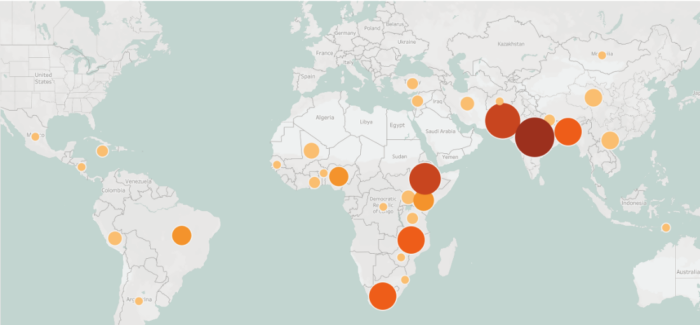Maternal Mental Health
Country Experiences
This page includes select sessions from a global maternal mental health (MMH) technical consultation discussing country experiences with implementing MMH programming, a map that illustrates where evidence is being generated, and a MMH talk series with country experts.
During the Giving Voice to the Silent Burden: Maternal Mental Health Technical Consultation that took place in September 2021, we heard from representatives from Ministries of Health, NGOs and facility level staff from several countries who shared experiences, learnings, and efforts to introduce policy level change as well as strengthen provider capacity. Note that to view all consultation session recordings, including those listed here, you must register.
This session focused on experiences and learning from Pakistan, Zimbabwe and Liberia to forge policies and practices aimed at integrating MMH services into the health system. Each country has had varying degrees of success in engaging national level governments and integrating mental health into primary health care. This session featured learnings from their experiences.
Key Takeaways
- In Liberia, despite maternal mental health is not mentioned in the existing Ministry of Health Policies including the National Mental Health Policy and Strategic Plan 2016-2021, the country has integrated screening tools for diagnosis into the public and private sectors, as well as managed indicators in the Health Management Information System to capture service data.
- In Zimbabwe, recognizing that the need for mental health services cannot currently be met by existing healthcare providers, the country linked with non-governmental organizations to meet the mental health needs of women and families. Through the Society for Pre and Post Natal Services (SPANS), the Ministry of Health is supporting a new cadre of health workers to promote and provide maternal mental health services.
- Pakistan is working to promote mental health at the highest policy level in the country, as well as pursuing universal health coverage, strengthening primary health care, and delivery of integrated health services. A national essential health services package has also been developed and finalized to include maternal mental health services. Health workers at primary health care level are now being trained to deliver mental health services.
Strengthening Provider Capacity to Support Quality MMH Care at Facility Level
This session introduced successful implementation strategies to ensure the presence of trained providers of maternal mental health care at facilities, with country experiences from Nigeria, Liberia, and Bangladesh. These strategies recognize that if training isn’t part of the overall, integrated planning process, it doesn’t work – provider training cannot be just an “add on”.
Key Takeaways
- Maternal, newborn, and child health care providers can be trained to screen for depression, anxiety, and other mental health conditions and to deliver psychosocial care during immunization, antenatal care, postnatal care, under five child, and general medical visits.
- Training community health care workers to provide mental health care has been found to be effective in improving their knowledge and competence.
- Promising implementation strategies suggest that efforts to strengthen provider capacity must be integrated into systems strengthening plans and fully institutionalized.
Where is the evidence being generated? The Landscape Analysis: The Silent Burden: Common Perinatal Mental Disorders in Low- and Middle-Income Countries includes a breakdown representing where the evidence of CPMDs is being generated. In the figure below, the larger and darker the dot, the more evidence is being published from that country/region.

Maternal Mental Health Talk Series
The Maternal Mental Health Talk Series is coming soon! Stay tuned for exciting conversations with maternal mental health experts from Botswana, Pakistan, and Zimbabwe. In this three-part series, learn more about country experiences related to emerging partnerships between non-governmental organizations and governments to meet the health needs of women and families, the role of government in shaping policy, the lived experience during pregnancy and the postpartum period-and more!

